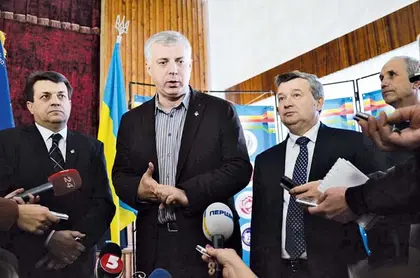“This is when I realized I can’t work at gunpoint,” says Nagornyak, acting dean of the history faculty.
Along with a group of other teachers, led by the university’s rector who had been ousted by the separatists, Nagornyak traveled to Vinnytsia in October to negotiate a move. Ukraine’s Education Ministry approved of it.
JOIN US ON TELEGRAM
Follow our coverage of the war on the @Kyivpost_official.
This is how the Donetsk National University became the first school in exile in Ukraine. Vinnytsia, a regional capital in central Ukraine, benefited from hosting it by getting its first liberal arts education institution this way.
The new academic year started on Nov. 3, two months later than it normally would. But to many employees it was literally the start of a new life, and a very difficult one.
University staff and students admit they haven’t received any salaries or stipends from the government since June, despite promises to resume payments to all institutions that moved from the territories controlled by the gunmen to those under control of Ukraine’s authorities.

So far, the staff has been working for free, just out of dedication. For many of them money is running out, leaving them in desperation.
“The finance ministry, Ukraine’s Prime Minister Arseniy Yatsenyuk and others told us we’ll receive our payments. It never happened. Sometimes I think they don’t want this altruistic project to be done,” Nagornyak says.
Roman Gryniuk, who heads the university, hopes payments will resume by the end of this week. He explained that the problem was technical in nature, and now that everyone has new bank accounts, things should get better.
Oleksandr Shlapak, Ukraine’s finance minister, during an televised interview on Nov. 8 said accommodation for students and staff would be paid for, as well as wages.
Back home, the university used to teach some 18,000 students. But only about 100 made it to Vinnytsia to continue their studies. Some 600 teachers, fellows and other staff moved as well. Gryniuk hopes that the number of students will grow to over 1,000 by the end of the year.
Some 30 percent of students and staff stayed behind in Donetsk. However, Nagornyak explains that at least some of her colleagues were unable to leave Donbas not because they support the self-proclaimed Donetsk People’s Republic, but for financial reasons.
All students from the occupied territories who wanted to continue their studies in Ukraine had to register by Oct. 15 at a special website launched by the education ministry. Some of them will become distance learners because they cannot afford to move. The university has technical capability to service correspondence course learners, according to the rector. Gryniuk says around 6,000 of students registered online will remain students. The rest will be expelled.
The ministry of education had previously said that diplomas issued by the remains of the university in Donetsk, headed by separatist-appointed rector, will not be recognized.
The new campus of the Donetsk National University in exile is located in the building of a local diamond cutting factory. Now the students are trying to not only catch up with their studies, but to help their teachers make the university livable. After the classes, many of them volunteer to clean up the grounds, Nagornyak says.
Accommodation for teachers remains the other critical issue after payment. Most of the students who made it to Vinnytsia now live in hotels, while professors are trying to rent apartments, Nagornyak says, and it turns out to be more difficult than they had thought it would be.
“People don’t want to rent apartments to those who fled Donetsk. But we are not angry with them, there is much stigma about the Donetsk people,” Nagornyak says. “But there are others who are ready to cooperate.”
Grynuik says the university hopes to get a couple of dorms for the students at some point, as well. Bohdan Chykailo, a freshman who did not hesitate to move to Vinnytsia from his native city of Shakhtarsk to get a Ukrainian diploma, lives in a hotel that was made available for students and shares his room with 20 other people. He pays Hr 30 per day.
Despite hardship, he looks into the future the optimism and is grateful to his enthusiastic professors.
“We were promised that stipend payments will resume in November. And our classes will become regular soon. However, we already had some lectures here, which is good,” Chykailo says.
He says he finally found peace in Vinnytsia and citizens welcomed them warmly. “Everything is so quiet here, there are Ukrainian flags all around us. And you know, only patriots moved here,” Chykailo explains. “There are no separatists among us.”
Kyiv Post staff writer Olena Goncharova can be reached at goncharova@kyivpost.com
You can also highlight the text and press Ctrl + Enter




